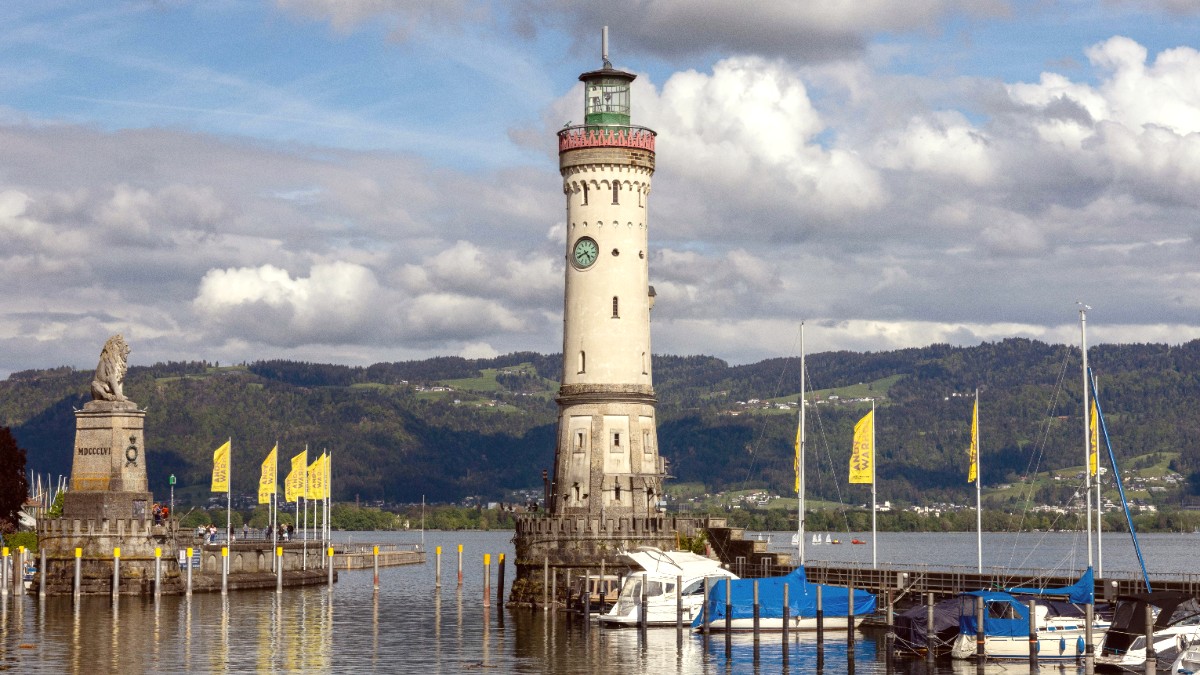
Germany
Lake Constance has distinct seasons, each offering a different atmosphere and activities. Your preferred activities shape the best time for your visit.
Climate patterns throughout the year: Spring (April-May): Temperatures typically range from 7-18°C (45-65°F). Weather generally mild, moderate precipitation. Humidity lower. Spring blooms, fresh air, ideal for outdoor exploration. Summer (June-August): Warmest, sunniest period, 20-27°C (68-80°F). Sunny, occasional brief intense thunderstorms for refreshment. Humidity moderate to higher. Long daylight hours for activities. Autumn (September-October): Temperatures cool to 7-18°C (45-65°F). Days often clear, bright, reduced precipitation. Humidity lower. Vineyards transform with colors, scenic drives and walks. Comfort without summer crowds. Winter (November-March): Temperatures typically -2-5°C (28-40°F). Winter often foggy, especially over the lake, creating a mystical atmosphere. Snow possible but not consistent. Humidity near the lake remains higher. Winter has tranquility, Christmas markets in December.
Water Sports and Swimming: July to August have the warmest lake temperatures, ideal for swimming, sailing, windsurfing, and paddleboarding. Mainau Island Flower Bloom: Mainau delights from March to October. Peak blooms vary: tulips in spring (April/May), roses in summer (June/July), and dahlias in autumn (September/October).
Christmas Markets: Late November to December bring festive Christmas markets to towns like Konstanz, Lindau, and Friedrichshafen, with seasonal treats and crafts.
Warmest weather, all attractions open, long daylight.
Warm weather welcomes swimming, boating, and all outdoor activities. Every attraction open, ferry services frequent. Long daylight hours.
Attractions and towns become crowded, specifically popular spots. Accommodation prices peak, finding last-minute availability is challenging. Restaurants experience peak demand, sometimes requiring reservations.
Pleasant temperatures, fewer crowds, lower prices.
Temperatures pleasant for cycling, hiking, and town exploration. Crowds fewer than in summer. Accommodation prices lower. Spring brings blooming nature, autumn offers colorful foliage and wine harvest events. Most attractions operate.
Evenings cool, requiring extra layers. Some specific ferry routes or smaller attractions might have reduced hours or close by late October. Weather less predictable than in summer.
Fewest crowds, budget-friendly, tranquil.
Fewest crowds, peaceful atmosphere. Accommodation prices lowest, budget-friendly travel. December features charming Christmas markets. Nearby alpine areas present winter sports.
Many outdoor attractions close or have limited hours. Ferry services significantly reduced, some routes suspended. Colder weather prevails, and the lake often has fog.
Schengen Visa: Citizens needing a visa for short stays (up to 90 days in 180-day period) in Europe will use a Schengen Visa. This permits travel across Germany, Switzerland, and Austria. Apply at the embassy of your main destination. Visa-Exempt Nationalities: Citizens of many countries (US, Canada, Australia, NZ, Japan, South Korea, most South American) do not need a visa for up to 90 days in the Schengen Area. ETIAS (European Travel Information and Authorisation System): From mid-2025, visa-exempt non-EU citizens will need an ETIAS authorization. This online application costs €7 and is valid for three years. Apply well in advance.
Passport: Valid for three months beyond departure from Schengen, issued within 10 years, two blank pages. Visa: Proof of valid Schengen visa, if applicable. Return Ticket: Proof of onward or return travel. Proof of Funds: Authorities recommend sufficient financial means (e.g., €45/day). Accommodation Proof: Confirmations of hotel bookings or invitation letters. Documentation supports a worry-free experience.
Valid for 3 months beyond departure, issued in last 10 years, 2 blank pages.
Proof of valid Schengen visa.
Proof of onward or return travel.
Around €45 per person per day.
Confirmations or invitation letters.
The currency in Germany and most of the European Union is the Euro (€). ATMs (Geldautomat) are widely available. They offer a simple way to withdraw cash at favorable rates. Most hotels, restaurants, and larger shops accept credit/debit cards (Visa, Mastercard, Maestro). Some smaller establishments or markets may prefer cash payments.
Prices vary by style and season. High season means higher costs, while off-season sees reductions.
| Type | Example | Cost |
|---|---|---|
| Local Transit | Single ticket (bus/train) | €2.50-4.00 |
| Daily Transit | Day pass (local) | €6-10 |
| Ferry Travel | Konstanz-Meersburg (passenger) | €5-10 |
Germany maintains high health and safety standards.
Ensure your routine vaccinations (MMR, DTP, Polio) are current. Consult doctor 4-6 weeks prior.
Sun's reflection off the lake can be intense. Use High-SPF sunscreen, wear a Wide-brimmed hat, and Sunglasses.
Stay hydrated, notably during summer activities. Carry a Reusable water bottle. Tap water in Germany is safe to drink.
Ticks are present in forested and grassy areas, especially during warmer months. When in nature, wear long trousers and Long-sleeved shirts. Check your body and clothing for ticks after outdoor activities.
Consider vaccination against Tick-borne Encephalitis (TBE) if you plan extensive outdoor activities in risk areas.
Lyme disease also presents a risk from tick bites. Prompt tick removal is critical.
Allergies: Pollen counts can be high in spring and summer. Pack any required antihistamines.
Germany has a high-quality healthcare system with trained professionals and modern facilities.
Doctors (Arzt) and pharmacies (Apotheke - green 'A' sign) are readily available. Pharmacists provide advice for minor ailments.
Dial 112 for medical emergencies (ambulance) and fire. Dial 110 for police. This is the general EU emergency number.
The Lake Constance region is generally very safe, with low crime rates.
Tap water throughout Germany, including Lake Constance, is safe and potable. Drink directly from the tap or public fountains.
Germany has high food safety standards. Restaurants, cafes, and vendors follow strict regulations. Enjoy street food and market offerings with confidence.
Travel insurance is important for all travelers. A comprehensive policy covers medical emergencies, evacuation, trip cancellation, and lost luggage. Verify your policy covers adventure activities if applicable.